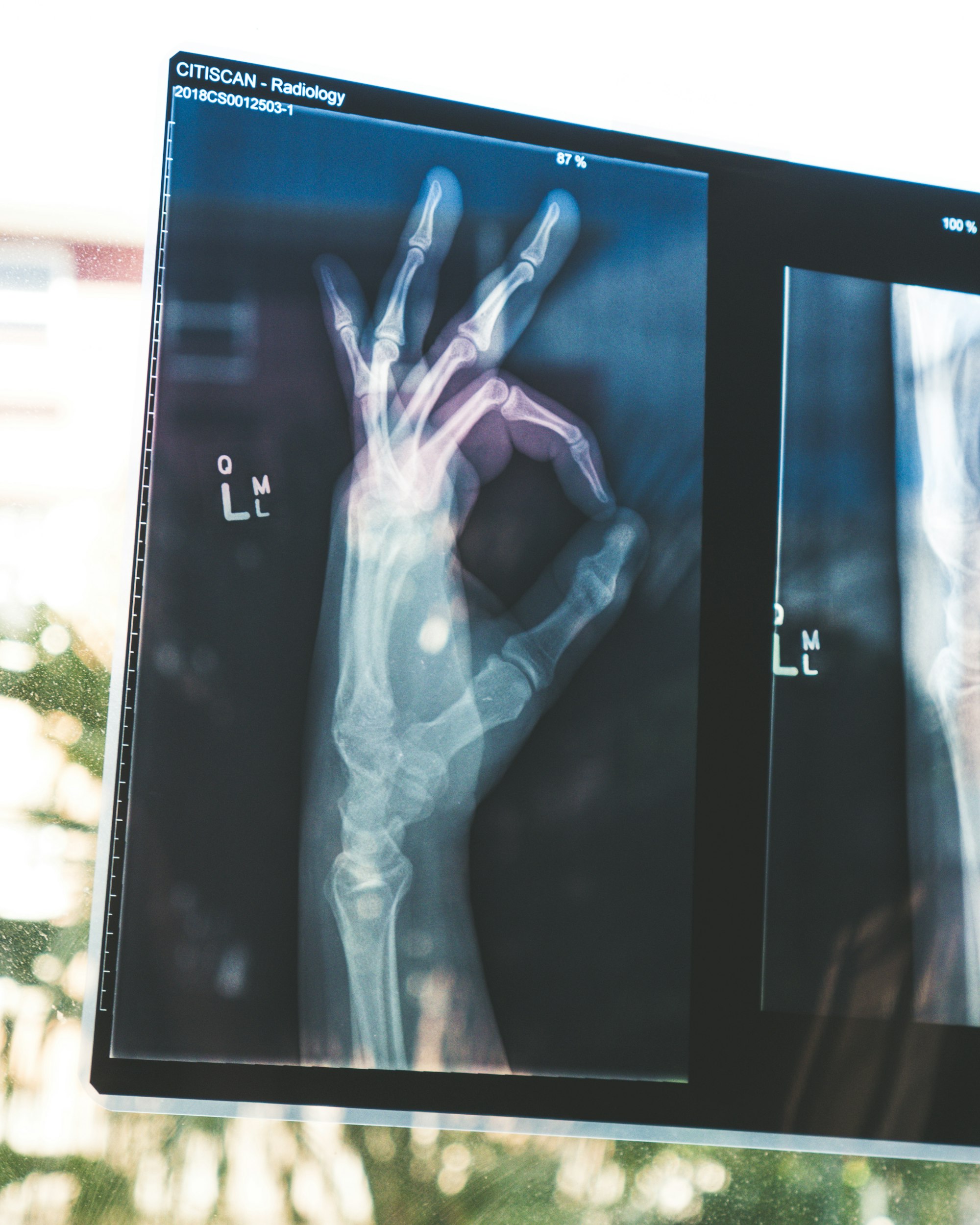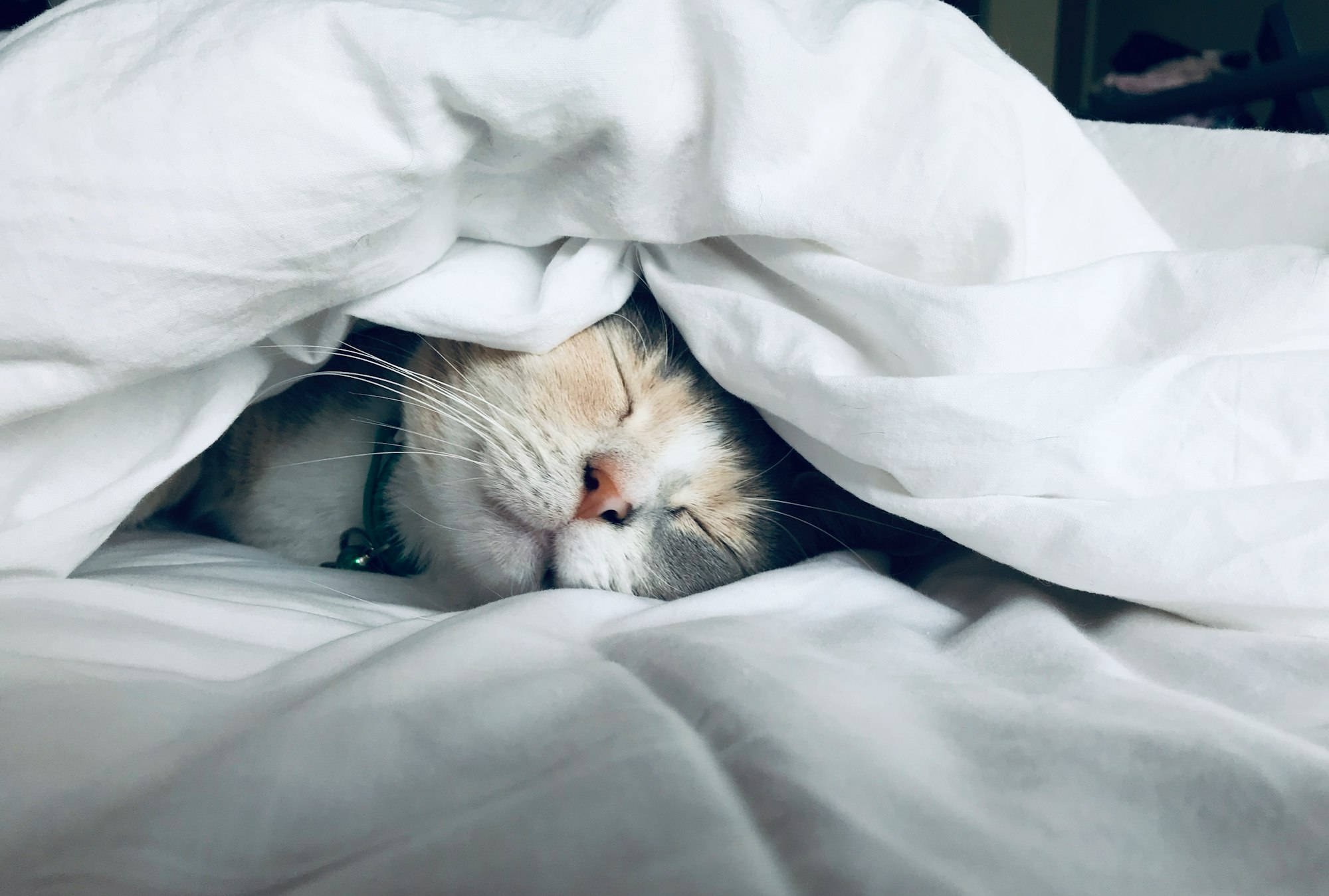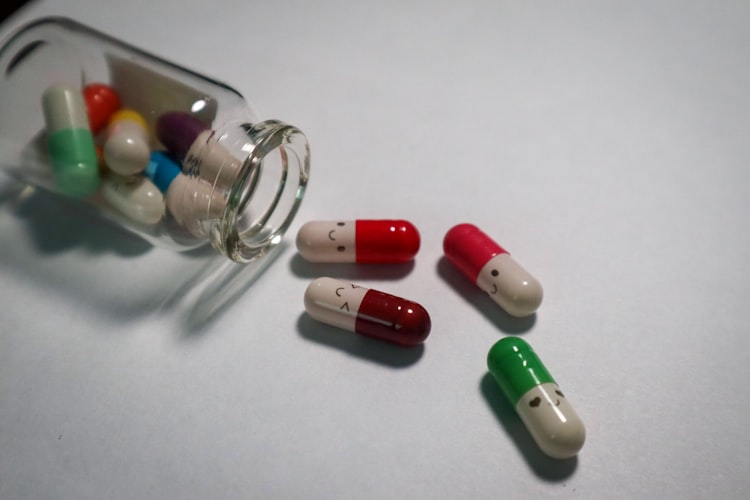Insomnia - A Complete Guide

Disclosure: this article contains affiliate links, which means that I may earn a commission from these companies (at no extra cost to you) if you purchase a product or service through these links. Please note that Ask Doctor Jad does not provide medical advice and any related content and correspondence should not be construed as such. Please see a doctor for a formal diagnosis and treatment plan.
What is insomnia?
Insomnia. A condition we’ve all heard of and one that too many of us have experienced.
Seriously.
But what exactly is it?
Insomnia is a sleep disorder which results in trouble sleeping on one end of the spectrum, and total sleeplessness on the other. This can manifest as trouble getting to sleep in the first place, difficulty staying asleep, or waking up early and being unable to get back to sleep.
Most adults need seven to eight hours of sleep a night. And when we don’t sleep enough, not only do we become exhausted and moody, but it can affect every aspect of your life.
I’m talking mental health, physical health, personal life and relationships, performance at work, and your general quality of life.
Everything.
Not good.
Thankfully, you don’t have to put up with any sleeplessness.
I’m going to cover everything you need to know about insomnia. From understanding the symptoms, the main insomnia causes, how to get a diagnosis, and most importantly, the best treatments for insomnia.
You're going to learn the three keys to a good night's sleep:
- Lifestyle changes - keep reading for more details!
- Therapy for insomnia - learn how to improve your sleep
- Sleep Support Plus - learn more
Now, read on to learn how to manage your insomnia in the best way possible.
And hopefully it won't be this article which puts you to sleep.
What are the symptoms of insomnia?
Insomnia can present itself in many different ways.
Insomnia symptoms include:
- Difficulty falling asleep
- Waking up in the middle of the night
- Waking up too early
- Feeling poorly rested after a night’s sleep
- Tiredness or sleepiness during the day
- Mood issues: irritability, anxiety, depression
- Poor concentration or memory
- Worries about your trouble sleeping or sleeplessness
We can also categorise insomnia depending on how long your symptoms last:
- Acute insomnia (short-term): symptoms lasting for days or weeks
- Chronic insomnia (long-term): symptoms present at least 3 days per week for more than three months, or repeated bouts of symptoms over years
How many of these insomnia symptoms do you have?
If you’ve experienced at least one, read on!
If you're the rare breed that hasn't experienced any, read on anyway!

What causes insomnia?
Good question.
Whether you’re worried about acute insomnia or chronic insomnia, there are many causes and more often than not, there’s more than one issue contributing to your sleeplessness at night.
Common causes of acute or chronic insomnia include:
Stress
- About studies, career, health, relationships, family, money, stressful life events, trauma, etc. The list goes on.
- Sound familiar?
- We’ve all been there. It’s very common and completely understandable for these issues to keep us up at night.
Bad sleep habits
- Let’s face it, we’re all guilty with this one.
- We’re talking: drinking too much caffeine and alcohol later in the day, taking naps during the day, having an irregular bedtime schedule, using your bed for work, eating, watching TV, and gaming.
- Using your computer, TV, phone or other screens too close to bedtime can also mess with your sleeping pattern.
- Basically, any stimulating activity before bed can cause sleeplessness (get your mind out of the gutter!)
Irregular work or travel schedules
- Have you heard of circadian rhythms?
- These are basically our internal clock which influence our sleep-wake cycle amongst other bodily functions such as temperature, metabolism and hormone production (to name a few).
- But let’s focus on our sleep-wake cycle for now, the cycle which determines when we sleep and when we wake.
- Who’d have thought.
- We can drive our circadian rhythm haywire by travelling and having to deal with jet lag frequently, as well as frequently changing shift patterns – for example, from early shifts to late shifts to night shifts and back. As a doctor, I’m very guilty of this one… Anyone else?
Bad eating (and drinking) habits
- Eating a large amount of food just before bed is a great way to guarantee trouble sleeping at night, as you might end up feeling full and uncomfortable whilst lying down.
- You may also end up with heartburn which is a consequence of acid reflux, a backflow of acid from the stomach and up the oesophagus (also known as the gullet or “food/ swallowing tube”). This uncomfortable burning sensation might also contribute to your insomnia.
- And finally, to reiterate the consequences of drinking caffeine or alcohol too close to bedtime!
- Caffeine is fairly self-explanatory, but did you know that alcohol can also worsen insomnia? Although it might make you fall asleep faster, drinking alcohol is associated with poor-quality sleep, which is one of the main reasons why we often wake up feeling like death after a night out. (That, and other questionable life decisions on said night out.)
So, those are the common stuff-of-life insomnia causes that will apply to most people.
But there are also some medical conditions and drugs associated with insomnia. And you should know about them.
These additional causes of insomnia commonly include:
Medical conditions
- There are so many medical conditions that can result in insomnia.
- Common ones include chronic pain, overactive thyroid (aka hyperthyroidism), asthma, gastroesophageal reflux disease (aka GERD or acid reflux), asthma, heart disease, diabetes, Parkinson’s disease and Alzheimer’s disease.
- Rarer conditions include fatal familial insomnia, a genetic condition which is much less common than the other conditions on this list. To name a few.
Mental health conditions
- Insomnia is very closely linked with mental health conditions, as all too many of us have experienced.
- Anxiety disorders (such as generalised anxiety disorder or post-traumatic stress disorder) can make it difficult to get to sleep, or may result in frequent awakenings throughout the night.
- Depression can result in waking up too early in the morning, and an inability to get back to sleep.
Medications
- Quite a few prescription medications can mess with your sleep, such as certain antidepressants or medications for blood pressure, asthma, and pain.
- Even some over-the-counter medications can contribute to insomnia, such as those for allergies or colds, as they often contain caffeine or other stimulants such as phenylephrine or pseudoephedrine.
Sleep disorders
- The most common sleep disorder is sleep apnoea, where your breathing stops and starts frequently throughout the night. It is more common in men, older people and people who are obese.
- Other sleep disorders include restless legs syndrome, resulting in unpleasant sensations in the legs and a very strong urge to move them, which often prevents you from falling asleep.
- Narcolepsy is a rare disorder which results in you falling asleep during the day uncontrollably as well as excessive daytime sleepiness – it is also associated with cataplexy which results in the involuntary loss of muscle strength and falls.
- Sleep paralysis is a condition which results in you, upon waking up or falling asleep, experiencing scary hallucinations whilst being unable to move (classically visual hallucinations of demon-like creatures occur).
Caffeine, alcohol, and nicotine
- Caffeine is commonly found in drinks such as coffee, tea, cola and energy drinks, and can prevent you from falling asleep if you drink them in the late afternoon or evening.
- Alcohol lulls you into a false sense of security in that it makes it easier to fall asleep, but it prevents you from entering the deeper stages of sleep and causes you to wake up in the middle of the night, resulting in an overall decreased quality of sleep.
- Nicotine is actually a stimulant which can also mess with your sleep!
What are the risk factors for insomnia?
Another great question. Without further ado.
Being a child and teenager
A somewhat unpreventable risk factor.
Our circadian rhythms are delayed during this phase of life, meaning that we want to go to sleep later and wake up later the following morning.
This is called delayed sleep phase.
See? A scientific reason for all the naughtiness!
Getting older
Another unpreventable one. Insomnia becomes more common as we age, especially in those aged 60 and up.
Don't be disheartened though, it's not a guaranteed part of ageing.
It's simply more common due to the following:
Changes to our health –
- Sleep disorders such as sleep apnoea and restless legs syndrome become more common.
- As do mental health conditions such as depression and anxiety.
- As does chronic pain from conditions such as arthritis or back problems.
- As do prostate and bladder problems interfering with our need to urinate during the night.
- All of these things can cause sleeplessness, trouble sleeping or waking up at night.
Medications –
- As we age, we’re more likely to be prescribed medications.
- This increases the chance of taking medication associated with insomnia as a side effect.
Changes to our sleeping patterns –
- As we age, we become more sensitive to noise and other things going on around us, so we’re more likely to wake up at night and have a less restful night of sleep.
- Our circadian rhythms change too, which is why we start to wake up earlier in the morning and get tired earlier in the evening. It’s perfectly natural.
Changes to our activity levels –
- It’s common to become less active physically and socially as we get older.
- This lack of activity can decrease the quality of our sleep.
- Especially if you end up taking naps during the day, which is a common reason why we have sleepless nights!
Being female
You may be starting to notice a pattern here with unpreventable risk factors.
- Women are more likely to develop insomnia.
- Changes to hormone levels during the menstrual cycle and menopause are to blame here.
- Specific menopause symptoms may also disrupt sleep, such as hot flushes and night sweats.
- Insomnia is also very commonly experienced by women during pregnancy.
If any of the insomnia causes discussed above apply to you.
- I won’t bore you by going over everything again, but things such as stress, caffeine, alcohol, nicotine, medical or mental health conditions or messy schedules can all come back with a vengeance!

How is insomnia diagnosed?
By a doctor. It’s always best to see your doctor if your insomnia is persistent or causing any issues with your daily life. And especially before starting or changing any treatment.
Your doctor may carry out the following:
History:
Of your sleep problems. If they start discussing World War II with you, maybe look for another doctor.
- They will ask you all sorts of questions related to your sleep, possibly including a questionnaire related to your sleeping pattern and severity of daytime sleepiness.
- They may ask you questions related to common complications of insomnia, to further assess your health.
- They may ask you questions related to health conditions associated with insomnia.
- Most the time, a conversation with your doctor is all it takes and many patients won't go for further tests.
Top tip: Keep a sleep diary and bring it in to show your doctor! They’ll love you for it, trust me.
Physical examination:
- There may be clues of underlying health conditions resulting in your insomnia.
- This may include a hand tremor sometimes seen in overactive thyroid glands or Parkinson’s disease.
Blood test:
I’m going to share with you the common blood tests we do for insomnia and the reasons why. Just to spare you the debt medical school leaves you.
- Full blood count – in this context, we’re looking in particular at the haemoglobin count for signs of anaemia
- Iron studies – on the anaemia front, evidence of iron deficiency anaemia is associated with restless legs syndrome
- Vitamin B12 – also a cause of anaemia, vitamin B12 deficiency is another possible cause of restless legs syndrome
- Renal function – a fancy way of saying “kidney function”. High levels of urea (a product of protein metabolism) seen in kidney disease is associated with sleep disorders such as excessive daytime sleepiness
- Liver function – liver failure is a cause of disrupted sleep patterns
- Thyroid function – overactive thyroids can make it difficult for us to get to sleep, whilst underactive thyroids may make us excessively sleepy
This is another reason why you should see your doctor if you're having persistent trouble sleeping or if your symptoms are worrying you.
Sleep study
- Also known as a polysomnogram or overnight sleep study.
- This involves you spending the night at a sleep centre with sensors on your head, face, eyelids, chest, arms and legs, and a finger. If you’re nice, you might be allowed to choose the finger.
- This is carried out to evaluate for certain sleep disorders, and depending on the outcome of your doctor’s appointment, they would be the one who decides to send you off for this.
- There is also a home-version of this called actigraphy – if your doctor wants you to undergo a sleep study and you’d prefer having one at home, discuss it with them.
Now that we've learned how insomnia is diagnosed, let's learn why we should treat it.

What are the complications of insomnia?
Now we’re getting to the super important stuff.
It's extremely important that acute insomnia or chronic insomnia is treated as quickly as humanly possible.
Why?
Because if it isn’t, there can be lots of complications which you’d be much happier avoiding.
We can split these complications into “life complications” and “health complications”.
Life complications:
- Doing badly at work
- Doing badly at school or university
- Relationship problems
- Higher risk of accidents due to slow reaction times
Health complications:
- Mental health conditions such as depression and anxiety disorders
- Increased risk of substance abuse, including alcohol and illicit drugs
- Medical conditions such as high blood pressure, which can lead to heart disease and stroke
Interested in avoiding the above? Read on!
What is the best treatment for insomnia?
Understandably, you’ll be wanting the best insomnia treatment available.
However, there are some things you need to know about the many types of insomnia treatment, from sleep medications to therapy, in order to make the best choice possible.
It’s important to understand that although there is no cure for insomnia, there are tons of effective insomnia treatment strategies to help get you back to sleep.
Let’s start with the simpler measures you can implement into your daily life.
Lifestyle Changes
Prevention is better than cure, as the old saying goes. Because it’s true. And this is how to do it.
- Limit your intake of caffeine and alcohol
- Don’t use nicotine
- Stay active
- Avoid naps
- Don’t eat or drink a lot close to bedtime
- Go to bed and wake up at the same time every day (including weekends)
- Only use your bedroom for sleep and sex – don’t let your brain associate it with work or other stimulating activities (apart from the one exception)
- Relax before going to bed, such as by taking a relaxing bath, listening to calming music or reading
- Check your medications to ensure they’re not contributing to insomnia
- Get a check-up to ensure you don’t have a condition contributing to insomnia
- Limit your exposure to blue light (screens) and bright light in the evening
These are great ways to get you to sleep.
The best thing is about these insomnia treatments is that there are no side effects and it’s free.
However, it’s very common that we find ourselves unable to do them all or do them consistently.
Sometimes life just gets in the way.
And that’s okay.
So, what next?
You should go see your doctor, who may recommend cognitive behavioural therapy, medications, or a combination of the two.
Cognitive behavioral therapy for insomnia
Cognitive behavioral therapy for insomnia, also known as CBT for insomnia or CBT-I, is a type of therapy that is usually recommended as first-line treatment for chronic insomnia.
CBT-I is at least as effective as sleep medications, so it's certainly worth giving it a go.
We can split CBT-I into a cognitive part and a behavioural part. It’s kind of in the name.
The cognitive part of CBT-I helps you recognise and change the thoughts that are stopping you from getting a good night’s sleep.
It also helps tackle that frustrating cycle of worrying so much about getting to sleep that you then have trouble falling asleep. Sound familiar?
The behavioural part of CBT-I helps you develop good behaviours that encourage a good night’s sleep and avoid the bad behaviours that stop you from sleeping well.
There are quite a few strategies used by therapists to achieve this, including:
- Relaxation techniques – to control your mood, muscle tension, breathing and heart rate to give you a relaxing night of sleep
- Sleep restriction therapy – to make you sleepier the following night and eventually encourage a healthier sleeping pattern
- Stimulus control therapy – to decondition your mind from resisting sleep, encouraging set bedtimes and nap avoidance, to name a few.
- Remaining passively awake – to get into bed and try to stay awake, which paradoxically helps you get to sleep.
- Light therapy – to use natural light or a light box to optimise your sleeping patterns
This is just a very brief outline of the incredible work therapists do to help millions of people suffering from insomnia.
You can read more about CBT-I here.
Not only are therapists great at treating insomnia, they can also help treat the very common complications of insomnia such as depression and anxiety.
And they could help you too.
It's like an everything-in-one.
The most important thing is to find a good therapist, which can actually be much harder than it sounds.
They need to be fully licensed, well-trained and able to tailor your therapy to your individual needs.
Luckily, Ask Doctor Jad has done the hard work to find some great therapists for you.
Click here to start improving your sleep and mental health with BetterHelp.
BetterHelp is a convenient and affordable online mental health service from high-quality therapists. It is leading the online therapy market and is regarded as a very high-quality service.
You answer a questionnaire at the beginning, which helps match you with a therapist that will suit you best.
These therapists are very carefully selected by BetterHelp to ensure that you have access to the best online therapists.
Therapy is generally highly recommended, whether you’re suffering from insomnia, some insomnia-related mental health issues, or another issue which is completely unrelated.
And BetterHelp is one of the best services currently available.
They're particularly respected for their top quality and attentive, personalised service.
Join through Ask Doctor Jad for a 15% discount off your first month

Medications
You may have found yourself asking: what is the best sleeping medication for insomnia?
Before we proceed, please remember to speak with your doctor before you take any medication.
Please also remember that any medication used for insomnia is only supposed to be a short-term treatment and you should aim to take them for no longer than 4 weeks, unless otherwise directed by your doctor.
Okay?
Okay.
Now we can move on.
We can split sleep medications into over-the-counter (non-prescription) sleep medication and prescription sleep medication.
Let’s start with the over-the-counter stuff.
Over-the-counter sleep supplements
There are quite a few over-the-counter supplements used to help get you to sleep.
Most of them are antihistamines, which are usually used to treat allergies but are commonly used as sleep medications as most (but not all) of them have a sedating effect.
Antihistamines used as sleep medications include diphenhydramine (Benadryl), doxylamine (Unisom), chlorphenamine (Piriton), promethazine, hydroxyzine, and cinnarizine.
To name a few.
Although they can be useful for some people, the problem with antihistamines is their side effects: daytime drowsiness, reduced coordination and reaction speeds, reduced judgement, dry mouth, blurred vision, difficulty peeing.
To name a few.
You can’t drive or operate machinery when you take these medications and a lot of people find these limitations and side effects to be not worth the bother.
So, are there any alternatives?
Spoiler alert: yes.
Melatonin.
Melatonin is a natural hormone produced in the brain. The pineal gland, if you want exact coordinates.
Its production in the brain is stimulated by darkness and inhibited by light. This helps regulate your circadian rhythm and sleep-wake cycle, giving you those great nights of sleep that you deserve.
Melatonin supplements are produced synthetically but have a similar effect to the melatonin that we make ourselves.
There's a lot of misinformation out there on melatonin so you can check out more details here. It's important to note that melatonin is not a solution for insomnia and should only be considered after consulting your doctor.
Melatonin is especially useful for people with:
- Delayed sleep-wake phase disorder: when your sleeping pattern is shifted later, usually by a few hours. Usually caused by obligations at work or school that force us to wake up in the early morning. Not exactly the most uncommon situation.
- Jet lag: caused by flights between different time zones.
Compared to antihistamines, melatonin doesn’t have many side effects (as long as you follow the instructions on the box).
The most common side effects are daytime drowsiness, dizziness and headaches, but only a minority of people who take melatonin experience side effects at all.
There are a lot of products out there claiming to be magic solutions for your sleep issues.
Sleep Support Plus is not one of them. It aims to promote sensations of calmness and relaxation, which encourages the body's natural processes to get you to sleep. It doesn't claim to be a magic sleeping aid or anything dodgy like that.
Honest marketing like this is what you should look for when considering any product.
In addition to melatonin, the other main ingredients include:
- Tryptophan – an essential amino acid we find in our diet, which promotes the production of melatonin and serotonin (an important mood neurotransmitter)
- Goji berry – which promotes feelings of calmness
- Lemon balm – which also promotes feelings of calmness and helps combat anxiety
- Chamomile – which helps you feel more relaxed. I can vouch for this, as an avid chamomile tea enthusiast!
- Valerian – a herb which helps relieve stress
Unless you’re pregnant, breastfeeding, or under the age of 18, in which case it’s not recommended.
And not to sound like a broken record, but always consult your doctor first and always read the instructions on the box. Safety first.

Prescription sleep medications
I’ll only lightly touch on this topic.
These medications are prescribed by doctors if you haven’t gotten a good night’s sleep with lifestyle changes, CBT-I and over-the-counter sleep medications like melatonin.
The prescription of sleeping pills is tightly regulated, mainly because they can have serious side effects and you can become addicted to them.
The common ones include Z-drugs such as zopiclone and zolpidem.
I personally don’t prescribe them for my patients unless absolutely necessary, and most of my colleagues have the same stance as me.
I’ll reiterate this again: if you’re struggling with insomnia, always see a doctor.
Always see a doctor before you take any medication.
The first priority when managing any health issue is staying safe, and that’s the best way to do it.

What should I do now?
So, to summarise.
If you’re concerned about your sleep, it’s always best to see a doctor and follow their advice over anything else (including this website). Have I mentioned that yet?
Start off with simple lifestyle changes like the ones I’ve discussed above.
If that doesn’t work or if your insomnia is disrupting your life, give therapy a go. Most people improve after only four to six sessions.
And if you and your doctor have agreed that trying a supplement is a good idea for you, Sleep Support Plus is an option for you to consider.
The most effective treatment strategy will be a combination of lifestyle changes and therapy. And I do appreciate that some people may benefit from short-term use of supplements to help them engage with the more long-term management strategies.
Will the treatment work?
You have to remember that there is no simple cure or easy fix for insomnia, and these measures are recommended to help you manage it as best as possible.
Managing your own expectations is really important. As nice as it would be, we can’t expect a perfect night of sleep every night.
As long as you’re getting enough good nights of sleep to be happy, healthy and functioning well most of the time, that’s probably a win.
Don’t be too hard on yourself and love yourself.
Having said that, a combination of lifestyle changes, therapy, and over-the-counter supplements like Sleep Support Plus do help a significant proportion of people.
So, let’s be positive (for now).
And when you feel like you need help, Ask Doctor Jad is here for you too.
Goodnight.








Member discussion